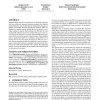Free Online Productivity Tools
i2Speak
i2Symbol
i2OCR
iTex2Img
iWeb2Print
iWeb2Shot
i2Type
iPdf2Split
iPdf2Merge
i2Bopomofo
i2Arabic
i2Style
i2Image
i2PDF
iLatex2Rtf
Sci2ools
CCS
2004
ACM
2004
ACM
A PIN-entry method resilient against shoulder surfing
Magnetic stripe cards are in common use for electronic payments and cash withdrawal. Reported incidents document that criminals easily pickpocket cards or skim them by swiping them through additional card readers. Personal identification numbers (PINs) are obtained by shoulder surfing, through the use of mirrors or concealed miniature cameras. Both elements, the PIN and the card, are generally sufficient to give the criminal full access to the victim's account. In this paper, we present alternative PIN entry methods to which we refer as cognitive trapdoor games. These methods make it significantly harder for a criminal to obtain PINs even if he fully observes the entire input and output of a PIN entry procedure. We also introduce the idea of probabilistic cognitive trapdoor games, which offer resilience to shoulder surfing even if the criminal records a PIN entry procedure with a camera. We studied the security as well as the usability of our methods, the results of which we also...
| Added | 20 Aug 2010 |
| Updated | 20 Aug 2010 |
| Type | Conference |
| Year | 2004 |
| Where | CCS |
| Authors | Volker Roth, Kai Richter, Rene Freidinger |
Comments (0)

